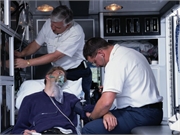- Could Your Grocery Store Meat Be Causing Recurring UTIs?
- Are You Making This Expensive Thermostat Error This Winter?
- Recognizing the Signs of Hypothyroidism
- 10 Strategies to Overcome Insomnia
- Could Artificial Sweeteners Be Aging the Brain Faster?
- Techniques for Soothing Your Nervous System
- Does the Water in Your House Smell Funny? Here’s Why
- Can a Daily Dose of Apple Cider Vinegar Actually Aid Weight Loss?
- 6 Health Beverages That Can Actually Spike Your Blood Sugar
- Treatment Options for Social Anxiety Disorder
Even With PPE, Risk of COVID-19 Still High for Frontline Workers

At the peak of the pandemic in the United States and United Kingdom, frontline health care workers, especially minorities, had much higher risks for COVID-19 than other individuals, a new study finds.
Paramedics, who are often the first to see sick patients, are at far greater risk of testing positive for COVID-19 than others, the researchers said. That’s especially true for frontline health care workers who are Black, Asian or from other minority ethnic backgrounds.
For the study, researchers at Massachusetts General Hospital in Boston reviewed data collected on a smartphone app from more than 2 million members of the general public and nearly 100,000 frontline health care workers in the United States and the United Kingdom. Between March 24 and April 23, more than 5,500 respondents tested positive for COVID-19.
Health care workers had at least a threefold increased risk of COVID-19, the study found. Black, Asian and minority health care workers had nearly twice the increased risk of their white counterparts.
Workers who reported lacking adequate personal protective equipment (PPE) — such as masks, gloves and gowns — had an especially higher risk. But even when adequate protection was available, some risk remained.
“Although it is clear that health care workers on the front line of the fight against COVID-19 have an increased risk of infection, our country continues to face vexing shortages of PPE,” said senior author Dr. Andrew Chan, chief of Mass General’s clinical and translational epidemiology unit.
“Our results underscore the importance of providing adequate access to PPE, and also suggest that systemic racism associated with inequalities to access to PPE likely contribute to the disproportionate risk of infection among minority frontline health care workers,” he added in a hospital news release.
The findings were published July 31 in The Lancet Public Health.
More information
For more on COVID-19, visit the U.S. Centers for Disease Control and Prevention.
Source: HealthDay
Copyright © 2026 HealthDay. All rights reserved.










